


This article highlights the essential medications for managing congestive heart failure in seniors, emphasizing the importance of personalized treatment plans. Are you or a loved one feeling overwhelmed by health concerns? Medications such as ACE inhibitors, ARBs, beta blockers, and newer options like SGLT2 inhibitors can significantly enhance health outcomes and quality of life for older adults. Research shows that when these medications are managed appropriately, there is a notable reduction in hospitalization rates and mortality.
In addition to this, it's crucial to understand that every individual's needs are unique. Tailoring treatment plans ensures that the specific health challenges faced by seniors are addressed compassionately. Remember, you are not alone in this journey; support is available to help navigate these important decisions. Together, we can work towards a healthier future.
Managing congestive heart failure can feel like a challenging journey, especially for seniors who often face multiple health concerns. The right medications have the potential to significantly enhance their quality of life. Yet, many individuals may not be aware of the most effective treatment options available to them. This article will explore ten essential medications that not only alleviate symptoms but also improve outcomes for older adults grappling with heart failure. As the landscape of heart failure treatment evolves, how can patients and caregivers ensure they are making informed choices about their medication management? We are here to help you navigate this important aspect of care.
At Amavita Cardiovascular and Vascular Health, we understand the challenges that older adults face when dealing with congestive cardiac dysfunction. Our commitment is to provide extensive medication management that includes congestive heart failure medications tailored specifically for you. We take a client-centered approach, ensuring that every treatment plan is customized to meet your unique needs. This includes:
In addition to this, we combine advanced outpatient techniques like cardiac catheterization and valve repair with compassionate support. Our goal is to enhance your quality of life while effectively managing the symptoms of cardiac insufficiency. We believe that every patient deserves innovative cardiovascular solutions, which is why we offer access to clinical trials. This ensures that you receive the best possible care, allowing you to live better, not just longer.
We invite you to reach out to us, as we are here to support you every step of the way. Your health and well-being are our top priorities, and together, we can navigate this journey towards improved health.
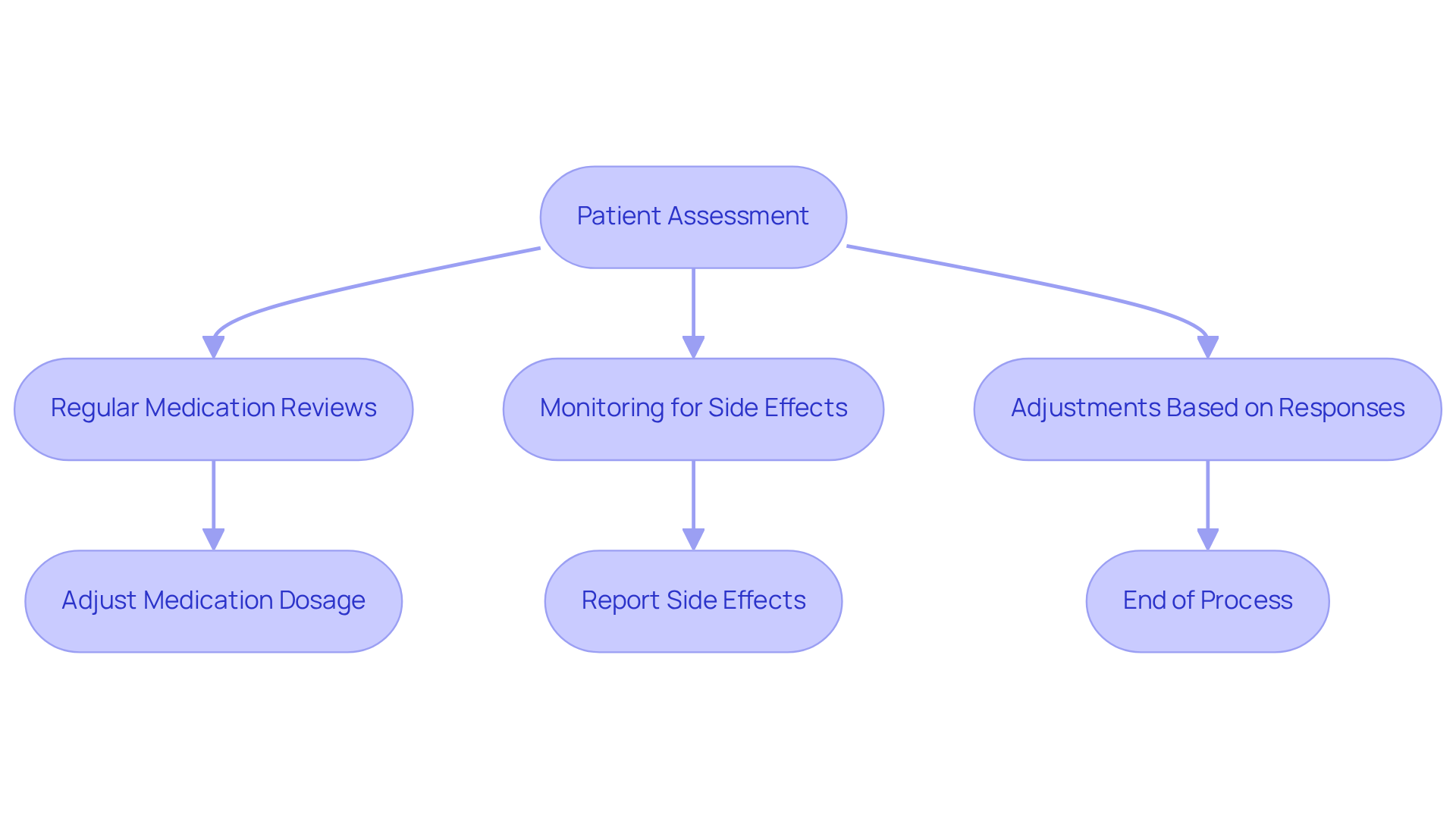
ACE inhibitors, like the commonly prescribed lisinopril and enalapril, are important congestive heart failure medications that play a crucial role in managing cardiac issues, particularly for older adults. These medications for congestive heart failure help by relaxing blood vessels, which eases the heart's workload and effectively lowers blood pressure. This function is especially beneficial for older adults, who often navigate multiple health challenges that can complicate the use of congestive heart failure medications.
Current guidelines emphasize the importance of regular monitoring of kidney function and potassium levels in older individuals taking ACE inhibitors. Because older adults may be more vulnerable to side effects, such as mild renal dysfunction, healthcare providers should closely monitor serum creatinine levels. If there is an increase in serum creatinine of more than 30% above baseline, it is essential to discontinue ACE inhibitors to avoid further complications.
Research indicates that congestive heart failure medications, such as ACE inhibitors, can significantly reduce cardiovascular mortality, suggesting a 17% relative decline in mortality rates among those using these medications. Despite these proven benefits, ACE inhibitors, which are key congestive heart failure medications, remain underutilized, with only 68% of eligible individuals receiving them.
Real-world experiences illustrate how side effects related to ACE inhibitors can be effectively managed in seniors. For example, potassium and magnesium supplements may be prescribed to address potential deficiencies caused by diuretics, which are often used alongside ACE inhibitors. Furthermore, clinicians have developed strategies to predict and manage adverse events, such as cough, which can occur during ACE inhibitor therapy. By adopting a personalized approach to treatment, healthcare providers can enhance the quality of life for older individuals while minimizing risks associated with congestive heart failure medications.
In addition to this, advanced diagnostic tools and comprehensive oversight strategies, such as those offered by Amavita's CardioElite™ program, can significantly improve outcomes for seniors in skilled nursing facilities. This program not only enhances proactive care for individuals but also reduces hospital readmissions, ensuring that elderly individuals receive tailored attention that meets their unique needs.

Angiotensin Receptor Blockers (ARBs), such as losartan and valsartan, provide effective relief as congestive heart failure medications for individuals who may experience side effects from ACE inhibitors. These congestive heart failure medications work by blocking the action of angiotensin II, which results in vasodilation and lower blood pressure. For seniors, who often face a higher occurrence of cough or angioedema related to ACE inhibitors, congestive heart failure medications such as ARBs can be especially beneficial. It's essential to have regular follow-ups to evaluate how well the congestive heart failure medications are working and to monitor for any potential adverse effects.
In skilled nursing facilities, incorporating ARBs into a comprehensive cardiovascular care program, like Amavita's CardioElite™, can significantly enhance patient care, especially for those requiring congestive heart failure medications. This program not only provides advanced diagnostic tools but also fosters seamless coordination among healthcare providers. Ultimately, this approach can help reduce hospital readmissions and improve overall health outcomes for patients taking congestive heart failure medications. Remember, you are not alone in this journey; there are caring professionals ready to support you every step of the way.
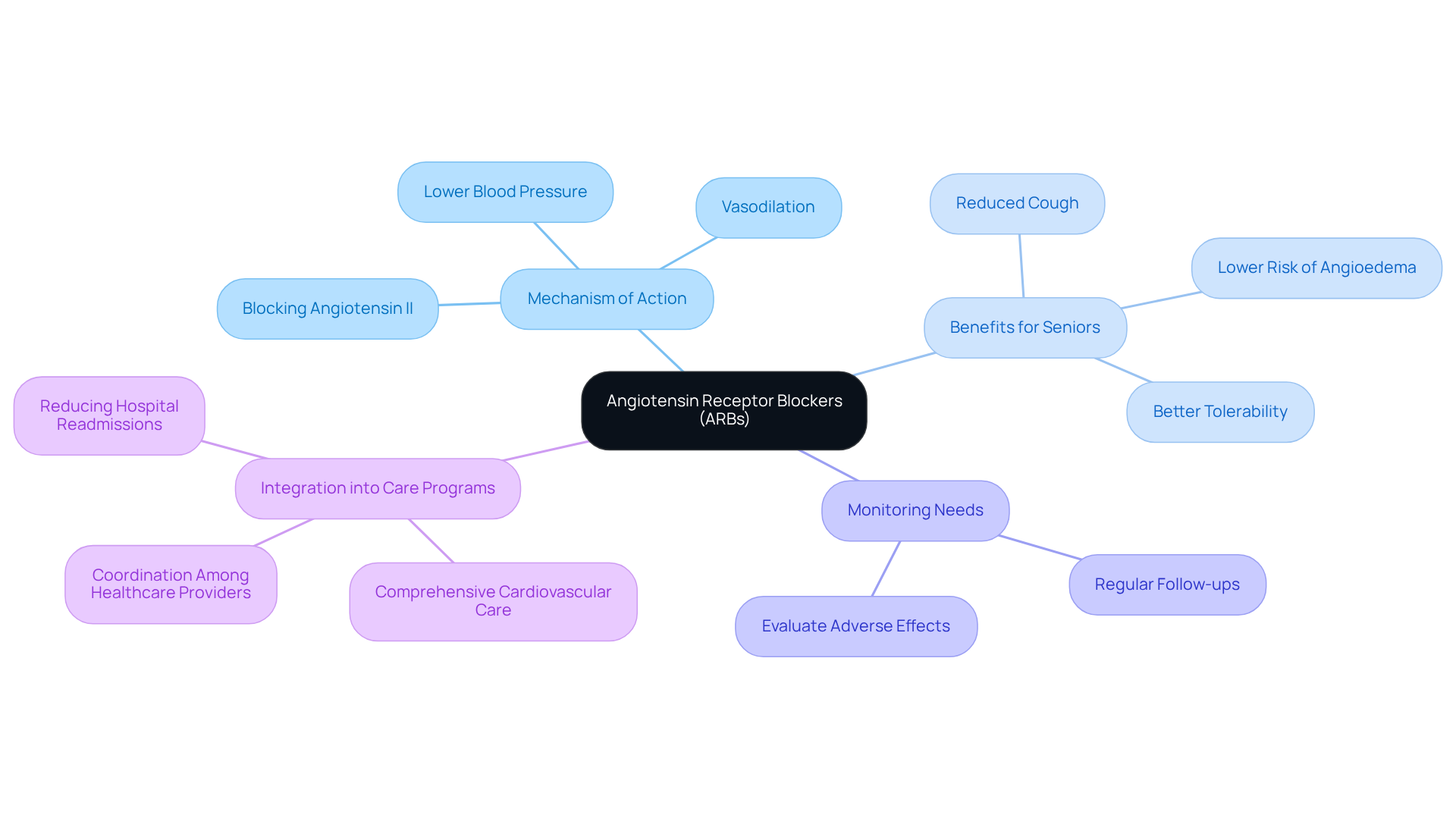
Sacubitril/valsartan, known as Entresto, symbolizes a meaningful advancement in the treatment of congestive heart failure medications, especially for our older loved ones. This innovative therapy combines neprilysin inhibition with angiotensin II receptor blockade, effectively addressing multiple pathways involved in heart health. Clinical trials consistently show that congestive heart failure medications, including sacubitril/valsartan, significantly reduce the risk of hospitalization and cardiovascular mortality in individuals with reduced ejection fraction (HFrEF).
In real-world settings, the benefits of Entresto are clear. For instance, the PIONEER-HF study revealed that patients receiving sacubitril/valsartan experienced a remarkable 44% decrease in the risk of readmission for cardiac issues within eight weeks compared to those on traditional treatments like enalapril. Furthermore, the PARADIGM-HF trial demonstrated a 20% relative risk reduction in the combined primary endpoint of cardiovascular mortality and hospitalization due to heart issues, underscoring the effectiveness of congestive heart failure medications.
Experts emphasize the importance of congestive heart failure medications, including Entresto, for older populations, where cardiac problems are prevalent. This medication not only improves clinical outcomes but also enhances quality of life, making it an essential option for seniors facing challenges that require congestive heart failure medications. When paired with comprehensive oversight strategies like Amavita's CardioElite™ SNF Program—integrating advanced diagnostic tools and 24/7 cardiology consultation, which has shown to reduce cardiac readmissions by 93%—the overall impact of sacubitril/valsartan is significantly amplified. Additionally, the CardioElite™ program results in considerable cost savings for skilled nursing facilities, ensuring that elderly patients receive the best possible care for their heart health. With its proven ability to lower hospitalization rates, sacubitril/valsartan is a vital treatment among congestive heart failure medications for managing cardiovascular complications in older adults.
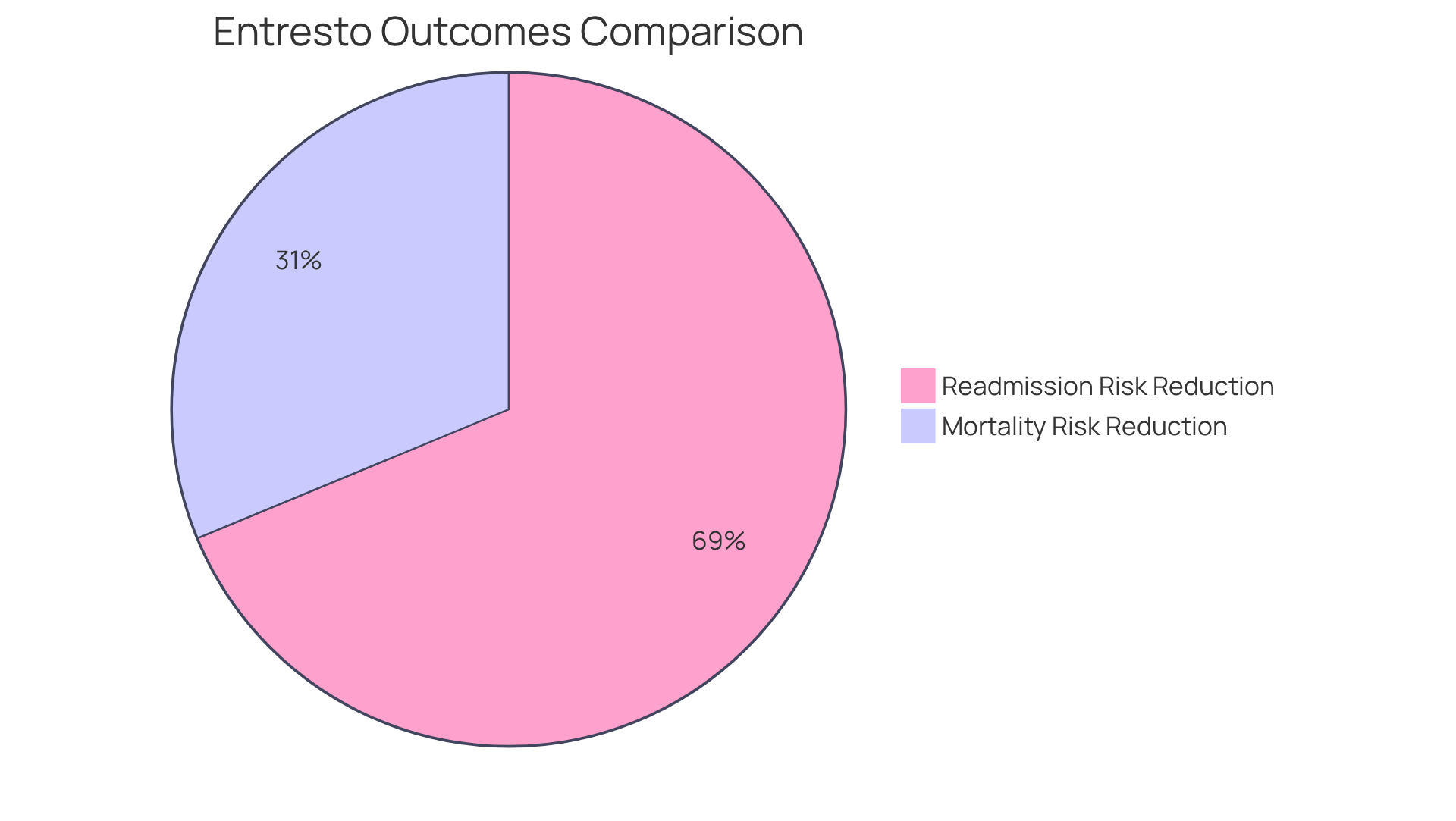
Beta blockers, such as carvedilol and metoprolol, are vital among congestive heart failure medications in managing cardiac failure, particularly for older adults who may feel overwhelmed by their health concerns. These congestive heart failure medications work effectively to slow the heart rate and lower blood pressure, which can improve heart function and significantly reduce the risk of hospitalization. Recent guidelines stress the importance of careful titration in older individuals, as this helps prevent potential adverse effects like hypotension and bradycardia. For instance, studies show that about 80% of older individuals tolerate carvedilol well, although achieving the right dosage can be challenging due to age-related factors.
Regular monitoring of heart rate and blood pressure is crucial for seniors on beta blockers. This practice not only ensures that individuals receive the appropriate dosage but also helps minimize potential side effects, allowing for a more comfortable experience. Cardiologists emphasize the importance of personalized treatment plans, indicating that while congestive heart failure medications like beta blockers can enhance outcomes, their use must be tailored to each individual's unique health profile. Internal medicine physicians view the CardioElite™ program as a 'clinical force multiplier,' improving care through advanced, real-time diagnostic information and 24/7 cardiology consultation.
Real-world examples illustrate that effective heart rate control through beta blocker therapy, when combined with the comprehensive management offered by CardioElite™, can lead to better overall management of congestive heart failure medications in older adults. This ultimately enhances their quality of life. Furthermore, the STRONG-HF trial has shown that intensive guideline-directed medical therapy titration, which includes congestive heart failure medications, can significantly improve outcomes for individuals compared to usual care, reinforcing the need for tailored approaches in this population. By integrating such strategies, Amavita aims to reduce hospital readmissions and improve outcomes in skilled nursing facilities, ensuring that every patient feels supported and cared for.
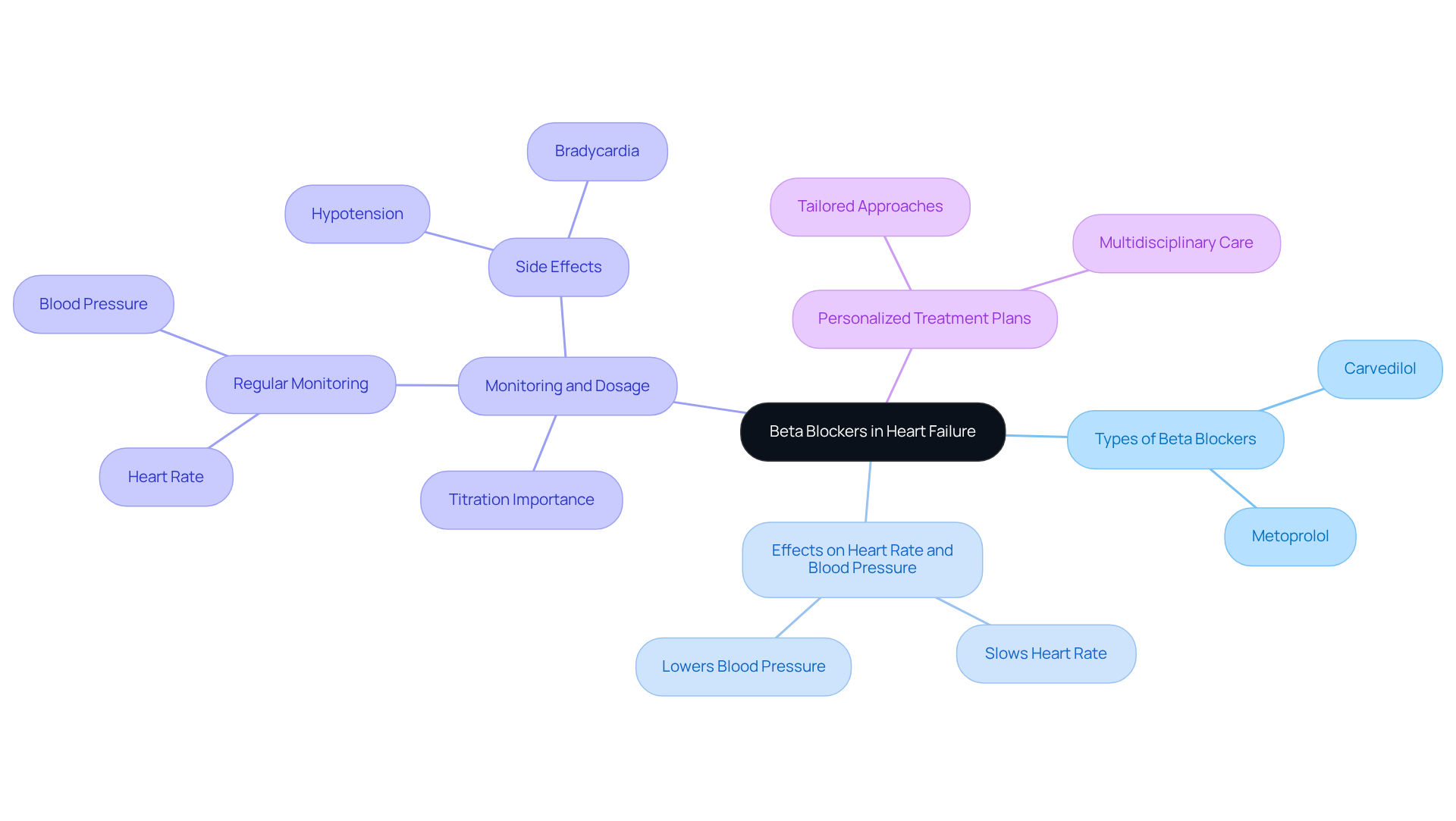
Aldosterone antagonists, such as spironolactone and eplerenone, are essential in managing fluid retention linked to congestive heart failure medications, particularly for seniors who often struggle with issues like edema and weight gain from fluid overload. These congestive heart failure medications work by blocking the effects of aldosterone, which helps increase sodium and water excretion. However, it’s important to be aware of the risk of hyperkalemia, a condition marked by elevated potassium levels, which necessitates careful monitoring, particularly in older adults with kidney issues.
Did you know that nearly 10% of individuals taking ACE inhibitors or ARBs miss out on the recommended potassium and creatinine tests? This highlights a significant gap in care that we must address. Nephrologists stress the importance of regular potassium monitoring for seniors on spironolactone and congestive heart failure medications, as the likelihood of hyperkalemia can rise with age and additional health conditions. In clinical practice, effective strategies for managing hyperkalemia include adjusting dosages of congestive heart failure medications and using potassium-lowering agents when needed.
Recent studies show that spironolactone, classified as one of the congestive heart failure medications, can reduce all-cause mortality by 30% and cut readmissions for cardiac issues by 35% in older adults, underscoring its effectiveness when monitored properly. Eplerenone, a more selective aldosterone antagonist, is among the congestive heart failure medications that offer a favorable side effect profile, making it a suitable alternative for those worried about the adverse effects of spironolactone.
As we navigate the evolving landscape of cardiovascular treatment, ongoing education and communication about the importance of potassium monitoring are crucial for optimizing outcomes for older individuals. Moreover, Amavita's CardioElite™ program enhances this management by providing advanced, real-time diagnostic information and 24/7 cardiology consultation. This proactive care approach not only aids in management but also reduces the risk of readmissions.
The CardioElite™ program acts as a clinical force multiplier, addressing the gaps in cardiac care that traditional episodic models often overlook, and transforming cardiac services for seniors. Remember, you are not alone in this journey; support is available to help you manage your health effectively.
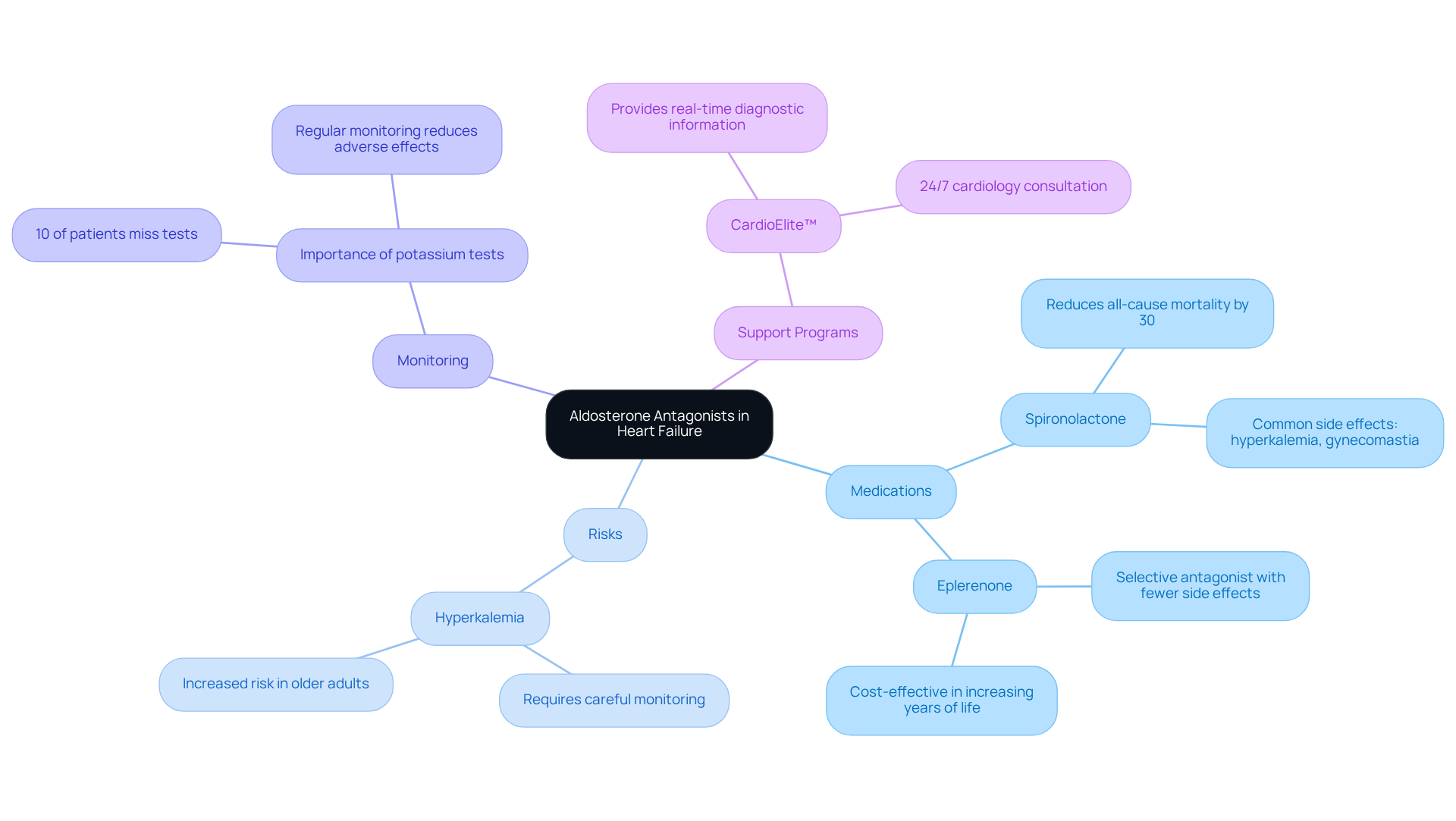
SGLT2 inhibitors, like empagliflozin and dapagliflozin, play a vital role in managing heart health, especially for those with preserved ejection fraction. These congestive heart failure medications not only promote diuresis to help alleviate fluid retention, but they also significantly reduce hospitalization rates related to cardiac issues.
It's important to note that SGLT2 inhibitors provide substantial renal protective benefits, which is particularly beneficial for seniors who often face kidney challenges. Research shows that these medications can lower the risk of cardiovascular events and enhance renal function, a crucial aspect for the elderly population.
For instance, studies suggest that SGLT2 inhibitors can decrease the rate of cardiovascular complications leading to hospitalization by as much as 30%. This highlights their effectiveness in real-world scenarios.
As ongoing research continues to uncover their full potential, SGLT2 inhibitors are increasingly recognized as essential components in the comprehensive management of cardiovascular health, particularly in relation to congestive heart failure medications among older individuals.
Remember, seeking support and guidance can lead to better health outcomes, and these medications may be a key part of that journey.
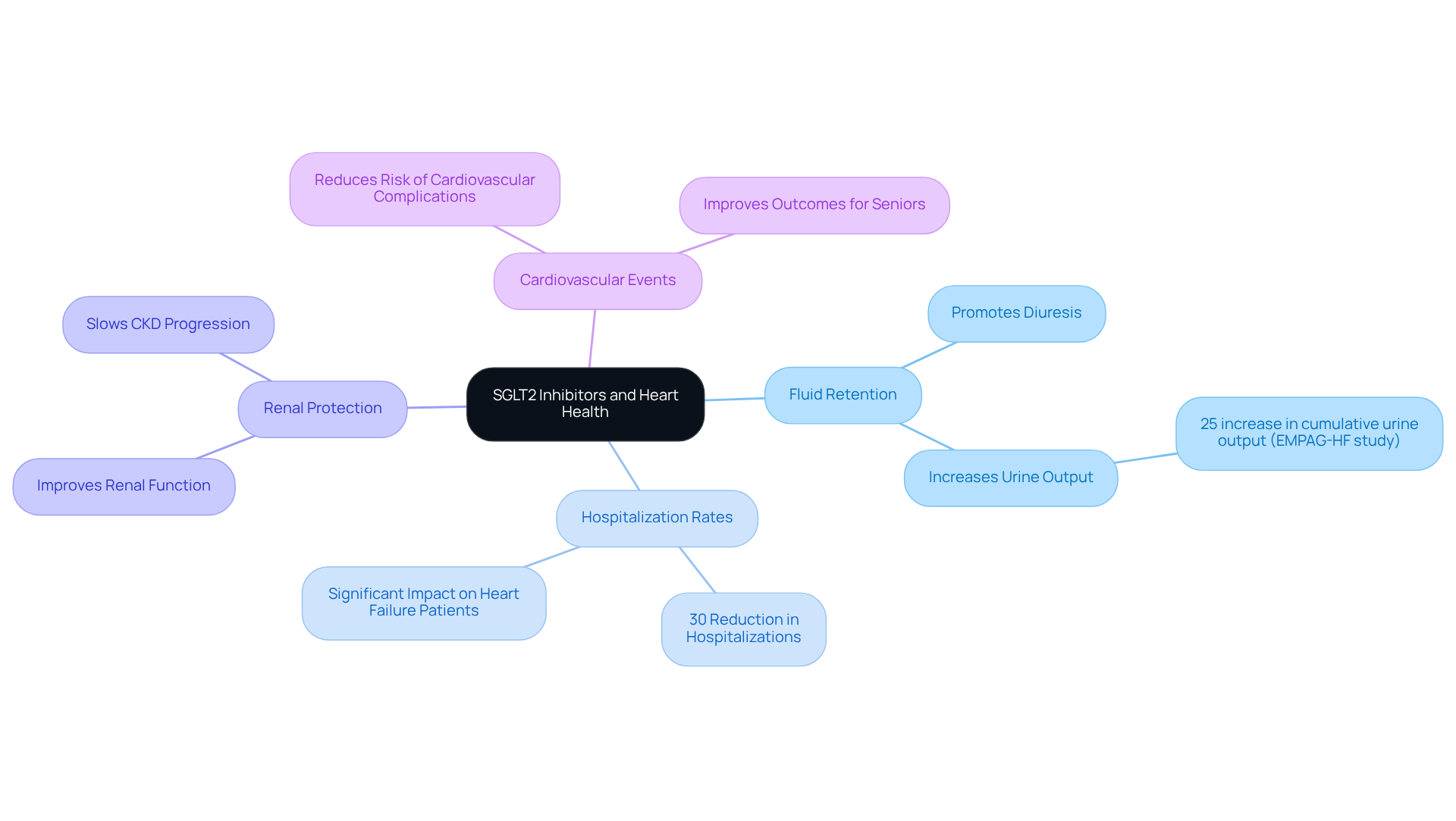
Diuretics, particularly loop diuretics like furosemide, play a vital role in managing fluid overload for individuals who are on congestive heart failure medications. They can significantly ease discomfort, such as shortness of breath and swelling, by encouraging urine production.
For our senior patients, it’s crucial to approach dosing and monitoring with care to prevent dehydration and maintain electrolyte balance. Regular evaluations of weight and fluid status are essential; they can help tailor diuretic therapy to individual needs, ensuring the best possible outcomes.
Remember, you are not alone in this journey—support is always available, and we are here to help you every step of the way.
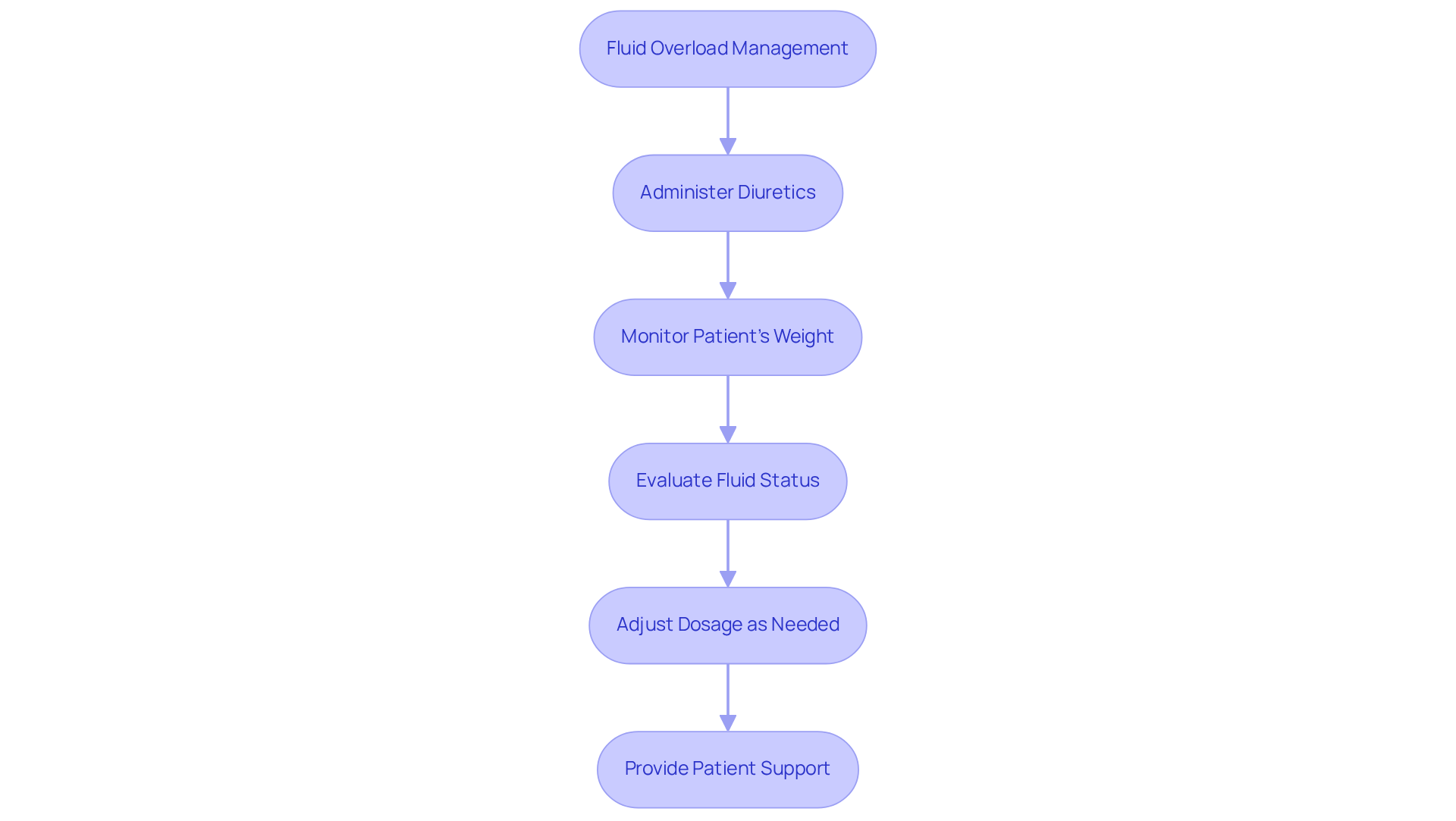
Hydralazine and isosorbide dinitrate are often prescribed together to manage cardiac issues, especially among African American individuals. This combination therapy has shown significant improvements in both morbidity and mortality rates, providing hope and relief. By expanding blood vessels, it effectively decreases the workload on the cardiac system, which is vital for older individuals who frequently encounter additional health challenges. Experts emphasize that while this therapy can be particularly beneficial for seniors, it requires vigilant monitoring to mitigate potential side effects, such as hypotension. Dr. Mihai Gheorghiade observes, "The combination of hydralazine and isosorbide dinitrate can greatly improve the quality of life for older individuals with cardiac issues." Many seniors have experienced improved quality of life and fewer hospitalizations when utilizing this combination therapy, demonstrating the significance of congestive heart failure medications in managing heart failure in this group.
Furthermore, incorporating sophisticated diagnostic tools and thorough oversight strategies, like those provided by Amavita's CardioElite™ program, can enhance outcomes for individuals and decrease hospital readmissions. Key benefits of the CardioElite™ program include:
Caregivers and individuals receiving care should consult with healthcare providers to discuss the potential benefits and necessary monitoring of this therapy, ensuring a supportive and informed approach to heart health.
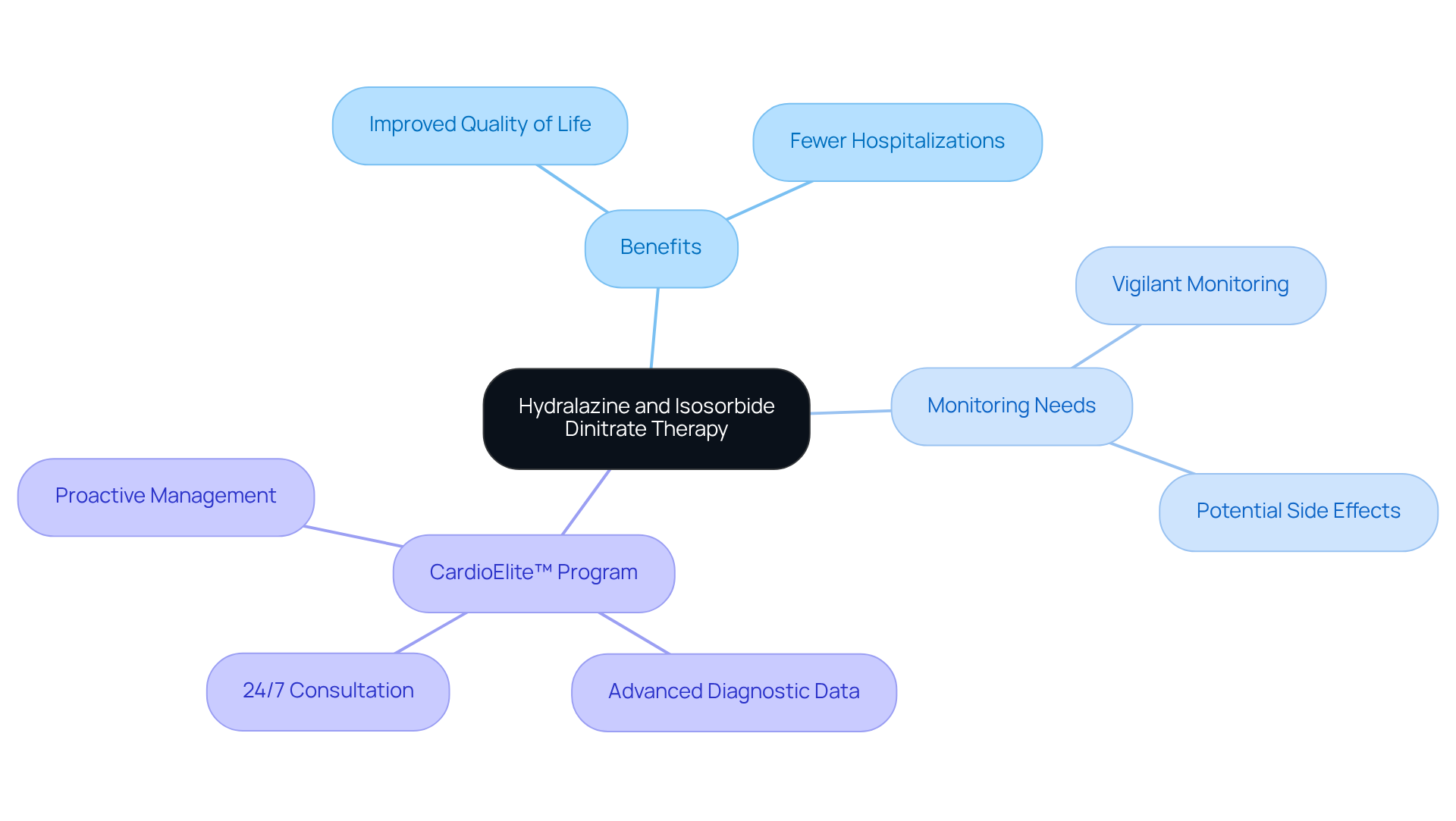
When it comes to managing cardiac failure, it's important to consider not only the main congestive heart failure medications but also alternatives like ivabradine and digoxin, which can significantly impact treatment outcomes for older individuals.
Given the unique health profiles of seniors, it's essential for healthcare providers to personalize treatment plans that cater to individual needs, taking into account existing comorbidities and potential side effects.
Regular follow-ups and thorough medication evaluations are crucial to ensure that elderly individuals receive the best possible care for their heart health.
Recent studies underscore the effectiveness of low-dose digoxin in lowering mortality and hospitalization rates, while ivabradine has shown promise in improving symptoms for those with preserved ejection fraction.
By tailoring these treatment strategies, we not only enhance patient outcomes but also align with the latest research advocating for personalized care in the management of congestive heart failure medications.
Remember, you are not alone in this journey, and support is always available to help you navigate your health concerns.
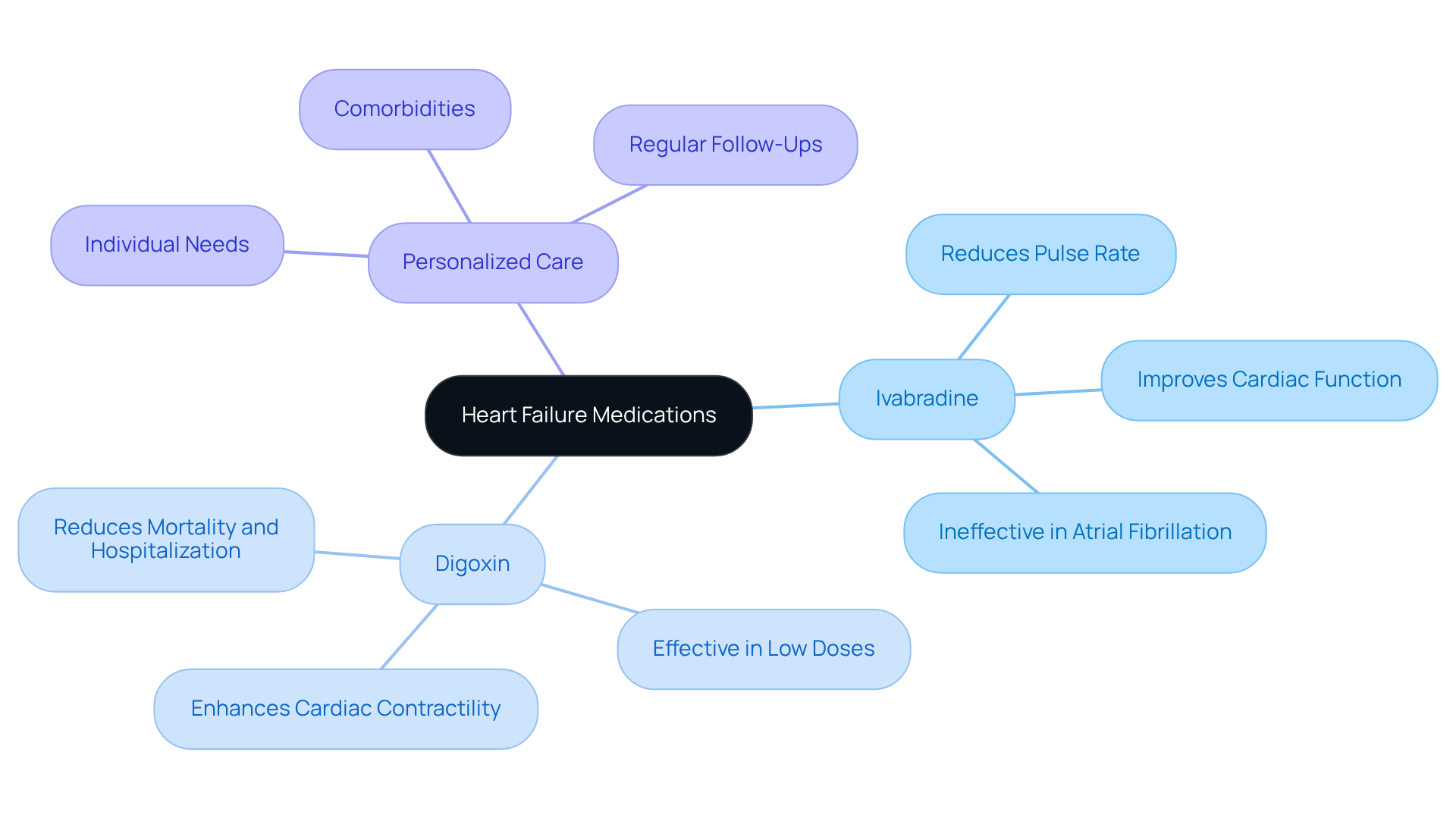
Managing congestive heart failure in seniors is a complex journey that requires a compassionate and personalized approach to medication. Essential medications such as:
play a vital role in enhancing heart health and improving the quality of life for older adults. These medications not only address the symptoms of heart failure but also strive to reduce hospitalizations and mortality rates, highlighting the importance of effective medication management.
Key insights reveal the necessity for regular monitoring and individualized treatment plans that cater to the unique health needs of seniors. For example, ACE inhibitors and ARBs have been shown to significantly lower cardiovascular mortality, while sacubitril/valsartan offers innovative therapy with proven benefits in reducing readmission rates. Furthermore, advanced programs like Amavita's CardioElite™ ensure that patients receive comprehensive care, including real-time diagnostics and continuous support, ultimately leading to better health outcomes.
In conclusion, effective management of congestive heart failure medications is essential for enhancing the lives of seniors. By embracing a holistic approach that prioritizes individualized care, healthcare providers can significantly improve the well-being of older adults facing cardiac challenges. It is crucial for patients and caregivers to remain informed and proactive in their treatment journey, seeking the necessary support to navigate the complexities of heart health. A commitment to personalized care and innovative treatment strategies will pave the way for a healthier future for seniors living with heart failure.
What services does Amavita Cardiovascular and Vascular Health provide for heart failure management?
Amavita provides comprehensive medication management for congestive heart failure, including regular medication reviews, monitoring for side effects, and adjustments based on individual responses to therapy.
How does Amavita ensure personalized treatment plans for heart failure patients?
Amavita takes a client-centered approach, customizing treatment plans to meet the unique needs of each patient, combined with advanced outpatient techniques and compassionate support.
What role do ACE inhibitors play in heart failure treatment?
ACE inhibitors, such as lisinopril and enalapril, help manage congestive heart failure by relaxing blood vessels, easing the heart's workload, and lowering blood pressure, which is particularly beneficial for older adults.
What precautions should be taken when older adults use ACE inhibitors?
Regular monitoring of kidney function and potassium levels is essential, as older adults may be more vulnerable to side effects. If serum creatinine increases by more than 30% above baseline, ACE inhibitors should be discontinued.
What are the benefits of using ACE inhibitors for heart failure patients?
Research indicates that ACE inhibitors can significantly reduce cardiovascular mortality, showing a 17% relative decline in mortality rates among users.
How can side effects from ACE inhibitors be managed in older adults?
Side effects can be managed by prescribing potassium and magnesium supplements to address deficiencies caused by diuretics, and healthcare providers can develop strategies to predict and manage adverse events like cough.
What are Angiotensin Receptor Blockers (ARBs) and how do they help in heart failure treatment?
ARBs, such as losartan and valsartan, are alternatives to ACE inhibitors that block the action of angiotensin II, resulting in vasodilation and lower blood pressure, and are beneficial for patients who experience side effects from ACE inhibitors.
How does Amavita's CardioElite™ program enhance care for heart failure patients?
The CardioElite™ program provides advanced diagnostic tools and fosters coordination among healthcare providers, improving outcomes for seniors in skilled nursing facilities and reducing hospital readmissions.
How can patients and families access support from Amavita?
Patients are encouraged to reach out to Amavita for support, as the organization prioritizes health and well-being and is dedicated to assisting individuals on their journey toward improved health.